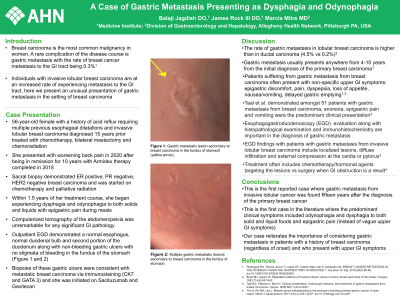Monday Poster Session
Category: Stomach
P2772 - A Case of Gastric Metastasis Presenting as Dysphagia and Odynophagia
Monday, October 23, 2023
10:30 AM - 4:15 PM PT
Location: Exhibit Hall

Has Audio
- BJ
Balaji Jagdish, DO
Allegheny General Hospital
Pittsburgh, Pennsylvania
Presenting Author(s)
Balaji Jagdish, DO1, James Rock III, DO1, Marcia Mitre, MD2
1Allegheny General Hospital, Pittsburgh, PA; 2Allegheny Center for Digestive Health, Pittsburgh, PA
Introduction: Breast carcinoma is the most common malignancy in women. A rare complication of the disease course is gastric metastasis. Here we present an unique case of gastric metastasis secondary to breast carcinoma presenting as dysphagia and odynophagia.
Case Description/Methods: A 56-year-old female with significant past medical history of acid reflux requiring multiple esophagogastroduodenoscopies (EGD) with esophageal dilations, left invasive lobular breast carcinoma treated with chemotherapy along with bilateral mastectomy and chemoradiation fifteen years ago presented to an outpatient oncology clinic for worsening backpain in 2020 after being in complete remission with ten years of Anastrozole therapy. MRI of the spine then demonstrated metastasis. Sacral biopsy demonstrated ER positive, PR negative, HER2 negative breast carcinoma. Chemotherapy and palliative radiation were initiated. Within 1.5 years of her treatment course, she began experiencing dysphagia and odynophagia to both solids and liquids with epigastric pain during meals. Computerized tomography of the abdomen/pelvis was unremarkable for any obstructive pathology. EGD showed no signs of obstruction, although non-bleeding gastric ulcers in the fundus of the stomach were present (Figure 1). Biopsies of these gastric ulcers were consistent with metastatic breast carcinoma via immunostaining. She was subsequently initiated on further chemotherapy along with over-the-counter medication for symptom control.
Discussion: While the exact mechanism to which gastric metastasis occurs in the setting of breast carcinoma is not well understood in the literature, it occurs more often in individuals diagnosed with invasive lobular breast carcinoma compared to those with invasive ductal carcinoma.
To the best of our knowledge, this is the first reported case where gastric metastasis from invasive lobular breast cancer was found fifteen years after the diagnosis of the primary breast cancer. This is the first case in the literature where the predominant clinical symptoms included odynophagia and dysphagia to both solid and liquid foods, symptoms that could have been alternatively explained by obstructive etiologies, such as strictures from acid reflux. Our case reiterates the importance of considering gastric metastasis as a potential differential in patients with a history of breast carcinoma, regardless of onset of the cancer, who present with upper gastrointestinal symptoms.

Disclosures:
Balaji Jagdish, DO1, James Rock III, DO1, Marcia Mitre, MD2. P2772 - A Case of Gastric Metastasis Presenting as Dysphagia and Odynophagia, ACG 2023 Annual Scientific Meeting Abstracts. Vancouver, BC, Canada: American College of Gastroenterology.
1Allegheny General Hospital, Pittsburgh, PA; 2Allegheny Center for Digestive Health, Pittsburgh, PA
Introduction: Breast carcinoma is the most common malignancy in women. A rare complication of the disease course is gastric metastasis. Here we present an unique case of gastric metastasis secondary to breast carcinoma presenting as dysphagia and odynophagia.
Case Description/Methods: A 56-year-old female with significant past medical history of acid reflux requiring multiple esophagogastroduodenoscopies (EGD) with esophageal dilations, left invasive lobular breast carcinoma treated with chemotherapy along with bilateral mastectomy and chemoradiation fifteen years ago presented to an outpatient oncology clinic for worsening backpain in 2020 after being in complete remission with ten years of Anastrozole therapy. MRI of the spine then demonstrated metastasis. Sacral biopsy demonstrated ER positive, PR negative, HER2 negative breast carcinoma. Chemotherapy and palliative radiation were initiated. Within 1.5 years of her treatment course, she began experiencing dysphagia and odynophagia to both solids and liquids with epigastric pain during meals. Computerized tomography of the abdomen/pelvis was unremarkable for any obstructive pathology. EGD showed no signs of obstruction, although non-bleeding gastric ulcers in the fundus of the stomach were present (Figure 1). Biopsies of these gastric ulcers were consistent with metastatic breast carcinoma via immunostaining. She was subsequently initiated on further chemotherapy along with over-the-counter medication for symptom control.
Discussion: While the exact mechanism to which gastric metastasis occurs in the setting of breast carcinoma is not well understood in the literature, it occurs more often in individuals diagnosed with invasive lobular breast carcinoma compared to those with invasive ductal carcinoma.
To the best of our knowledge, this is the first reported case where gastric metastasis from invasive lobular breast cancer was found fifteen years after the diagnosis of the primary breast cancer. This is the first case in the literature where the predominant clinical symptoms included odynophagia and dysphagia to both solid and liquid foods, symptoms that could have been alternatively explained by obstructive etiologies, such as strictures from acid reflux. Our case reiterates the importance of considering gastric metastasis as a potential differential in patients with a history of breast carcinoma, regardless of onset of the cancer, who present with upper gastrointestinal symptoms.

Figure: Figure 1: Gastric metastatic lesion secondary to breast carcinoma in the fundus of stomach (yellow arrow).
Disclosures:
Balaji Jagdish indicated no relevant financial relationships.
James Rock III indicated no relevant financial relationships.
Marcia Mitre indicated no relevant financial relationships.
Balaji Jagdish, DO1, James Rock III, DO1, Marcia Mitre, MD2. P2772 - A Case of Gastric Metastasis Presenting as Dysphagia and Odynophagia, ACG 2023 Annual Scientific Meeting Abstracts. Vancouver, BC, Canada: American College of Gastroenterology.
